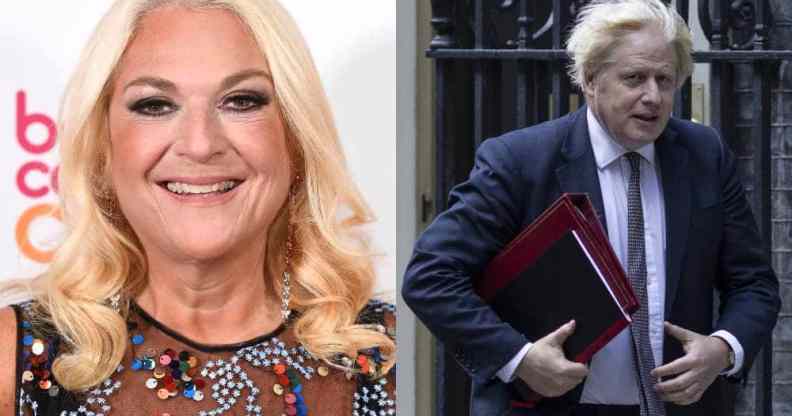TV icon Vanessa Feltz slams government’s failure to ban conversion therapy: ‘It’s disgraceful’

Vanessa Feltz has slammed the UK government for failing to ban conversion therapy, saying it’s “disgraceful it hasn’t been outlawed”.(Getty/Jeff Spicer/Breast Cancer Care/Dan Kitwood)
Vanessa Feltz has come out swinging for LGBT+ rights as the TV personality slams the UK government’s “disgraceful” failure to ban conversion therapy.
The beloved TV and radio presenter spoke out against the discredited practice in an appearance on LGBT+ podcast A Gay and A NonGay on Wednesday (25 August). She told hosts James Barr and Dan Hudson that she couldn’t see any “sound reason or possible justification” for the UK government to have not already banned the “abuse and contemptible” practice.
“I cannot see any reason at all – ANY reason at all, any sound reason or possible justification for not moving all possible hindrances to stopping this… it’s abusive and contemptible that it should be allowed to continue in any form whatsoever,” Vanessa Feltz said.
She continued: “It’s disgraceful that it hasn’t been outlawed, punished, condemned vigorously on front pages and by politicians of all persuasions.”
Vanessa Feltz isn’t the only one who wants to see conversion therapy banned for good
Queen Elizabeth II promised that a conversion therapy ban would be brought forward during her speech at the State Opening of Parliament in May. This would bring the UK in line with other countries across the world that have banned or are banning the discredited, barbaric and abhorrent practice, including New Zealand and Germany.
Shortly after the Queen’s speech, Liz Truss, minister for women and equalities, confirmed that legislation would be brought forward following a public consultation. She said in a statement that the UK government has “always been committed to stamping out the practice of conversion therapy”.
“We want to make sure that people in this country are protected, and these proposals mean nobody will be subjected to coercive and abhorrent conversion therapy,” Truss said.
“Alongside this legislation, we will make new funding available to ensure that victims have better access to the support they need.”
However, the equalities office has given no timeline for legislation banning conversion therapy. Instead, it has insisted a ban would be introduced “as soon as parliamentary time allows, and following a consultation”.
The consultation would seek opinions of the public and key stakeholders to “ensure that the ban can address the practice while protecting the medical profession; defending freedom of speech; and upholding religious freedom”.
This promise comes three years after the Conservative Party pledged to “eradicate” the practice in the UK as part of their LGBT+ Action Plan in 2018.
In March, prime minister Boris Johnson promised to “stamp out” conversion therapy, following the resignation of the government’s now-disbanded LGBT+ advisory board. But Johnson claimed a ban would be “technically complex to deal with”.
'This practice is repulsive and I think it's abhorrent'@BorisJohnson commits to end the practice of conversion therapy https://t.co/isHVF99Pn3 pic.twitter.com/5Z5yN7zsF5
— ITV News Politics (@ITVNewsPolitics) March 12, 2021
The lack of response and movement on the government’s part prompted lawyers, politicians, academics and activists to band together to tell Johnson exactly how to legislate for a ban on conversion therapy.
The Ban Conversion Therapy Legal Forum, convened by campaigner Jayne Ozanne and chaired by barrister and House of Lords member Baroness Helena Kennedy, explained that the “best way of banning conversion therapy is by using a combination of both civil and criminal remedies”.
The forum added: “Legislation banning conversion therapy must be human rights compliant. The rights of victims and potential victims of conversion therapy must be prioritised.
“The way in which conversion therapy denies human dignity and demeans its victims amounts to degrading and inhuman treatment. And by denying their identity, it also destroys their private life. By definition, conversion therapy is discriminatory.”
The forum has offered to “work with the government to ensure that the ban on conversion therapy works in a variety of settings, and that no one is excluded from its protection”.

